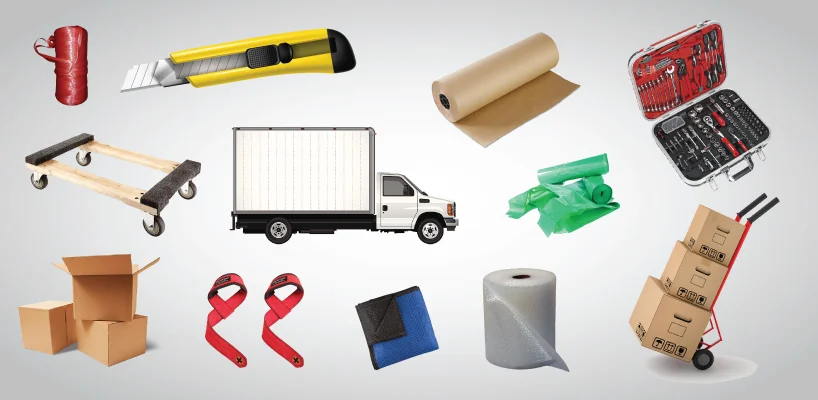In 2024, moving costs have risen by 10%. Picking the right movers can help save both money and stress. But how do you choose the right type of mover when you are caught between a rock and a hard place?
The challenge many people face is deciding between local and long-distance movers, each with its own set of advantages and pitfalls. Understanding these differences is key to making an informed decision.
The problem is that many people don’t see the forest for the trees when choosing movers. Local movers might fit the bill for short hauls but may fall short for long journeys. On the other hand, long-distance movers can handle extensive relocations but might come with a hefty price tag and longer lead times.
Therefore, we will discuss the key differences between local and long-distance movers, explore their services, costs, and unique features, and offer advice on selecting the right mover for your next relocation.
How Local and Long-Distance Movers Differ
Local Moves
Local movers are designed for short-distance relocations, usually within the same city or nearby area. These movers handle tasks such as packing, loading, and unloading efficiently. For instance, a typical local move might cover a distance of about 20 to 50 miles.
The major advantage of using local movers is their knowledge of the area, which can make for a smoother and faster move. Since they operate within a smaller radius, their services are usually more affordable. However, local movers might not have the capacity or equipment for larger or more complex moves. In other words, they might not be up to the task if you move a house full of heavy furniture or delicate items over a short distance.

Choosing local moving companies can save you up to 30% compared to long-distance moves and often provides more personalized service for your neighborhood relocation.
Long-Distance Moves
Long-distance movers, on the other hand, handle relocations that stretch across states or even across the country. For example, a long-distance move might involve traveling from New York to California, covering over 2,500 miles.
One of the main benefits of long-distance movers is their ability to manage the complexities of interstate travel, such as navigating different state regulations and handling large shipments. Long-distance moving companies often provide additional services like packing materials and insurance, which can be a lifesaver for expensive or fragile items. However, this added convenience comes with a higher price tag and a longer planning period.
Need help for just a couple of hours? Read how to hire movers for a short stint without breaking the bank or losing your sanity.
How Local and Long-Distance Moves Are Planned
Local Moves
Planning a local move is often less complicated compared to a long-distance relocation, but it still requires careful preparation. Here’s a rundown of the typical planning steps:
- Initial Assessment: Begin by evaluating the size of your move. This includes determining the number of rooms, the volume of belongings, and any special items that might require extra care. A local move usually involves distances of up to 50 miles, so it's essential to plan for the packing and transport of items within this range.
- Choosing a Mover: Research local moving companies and request quotes. Most local moves are priced by the hour, so the cost will depend on the time needed to complete the move. It’s wise to get estimates from at least three movers to compare prices and services.
- Packing: Start packing non-essential items well in advance of the moving day. Local movers might offer packing services, but many people prefer to handle this themselves to save money. Make sure to label boxes clearly to make unpacking easier.
- Scheduling: Local moves often have more flexible scheduling options. Choose a date and time that works best for you, keeping in mind any potential traffic issues or building regulations.
- Final Preparations: Confirm the details with your mover a day or two before the move. Make sure all belongings are packed and ready for transport and do a final walkthrough of your home to ensure nothing is left behind.

Some affordable long-distance moving companies offer budget-friendly packages without compromising on quality. With careful research, you can find reliable movers who provide cost-effective solutions for cross-country relocations.
Long-Distance Moves
Planning a long-distance move involves a more detailed process due to the greater distance and additional logistics. Here’s how to approach it:
- Early Planning: Begin planning your move at least 8-12 weeks in advance. Long-distance moves often require more time to coordinate due to the complex logistics involved, such as crossing state lines or coordinating with multiple transport services.
- Get Quotes: Contact several long-distance moving companies for estimates. Unlike local moves, long-distance moves are generally priced based on the weight of your shipment and the distance traveled. Expect quotes to range from $2,000 to $5,000 or more.
- Inventory and Packing: Create a detailed inventory of your belongings. This will help movers provide a more accurate estimate and ensure that all items are accounted for during the move. Long-distance movers might offer packing services, but if you do it yourself, use high-quality packing materials to protect your items over the long haul.
- Logistics: Coordinate the logistics of your move, including the timing of your departure and arrival, and any required permits or regulations for crossing state lines. Long-distance moves often involve coordinating with multiple moving teams and ensuring that all paperwork is in order.
- Final Steps: Confirm the moving date and details with the moving company well in advance. Make sure to address any specific needs or concerns, such as handling delicate items or arranging for storage if needed.
Time Required for Local vs. Long-Distance Moves
Ever wondered why some moves seem to drag on while others wrap up in no time? Understanding the time required for local vs long-distance moves can help you plan better and avoid any surprises.
Here’s a breakdown of the typical time required for local vs long-distance moves:
| Aspect | Local Moves | Long-Distance Moves |
|---|---|---|
| Planning Time | 1-2 weeks | 8-12 weeks |
| Packing Time | 1-3 days (for a small apartment) | 1-2 weeks (for a large house) |
| Loading Time | 2-4 hours | 4-8 hours (may be spread over multiple days) |
| Travel Time | 1-3 hours (depending on distance) | 1-7 days (depending on distance, e.g., cross-country) |
| Unloading Time | 2-4 hours | 4-8 hours (may be spread over multiple days) |
| Total Time | 1 day to 1.5 days | 3-10 days (including travel and loading/unloading) |
Key Takeaways:
- Local Moves: Typically involve shorter distances and can often be completed in a single day by the local moving companies. The time required can vary based on the size of the home and the distance within the local area.
- Long-Distance Moves: Require more time due to the greater distance, packing complexity, and logistical coordination by the long-distance moving companies. The total time includes not only the move itself but also the time needed for travel between locations.
Differences in Services Between Local and Long-Distance Movers
Before you sign on the dotted line, knowing what’s in the package is crucial. Below is a comparison of the services offered by local vs long distance moving companies:
| Service Aspect | Local Movers | Long-Distance Movers |
|---|---|---|
| Distance Covered | Typically, within the same city or metropolitan area | Interstate or cross-country |
| Pricing Structure | Often hourly rates (e.g., $80-$120 per hour) | Typically based on weight and distance ($2,000-$5,000+) |
| Packing Services | May offer basic packing or require DIY | Often provide full packing services and materials |
| Loading/Unloading | Generally straightforward; quick turnaround | It can be more complex with multiple teams involved |
| Storage Solutions | Limited options for short-term storage | Often offer long-term and short-term storage options |
| Specialty Services | Limited; may not handle large or delicate items | Specialized services for fragile, valuable, or bulky items |
| Insurance Coverage | Basic coverage; may offer additional insurance | Comprehensive insurance options and additional coverage |
| Vehicle Transport | Not typically offered | Frequently included for cars and other vehicles |
| Regulatory Compliance | Local regulations; less complex | Compliance with interstate regulations; more complex |
| Estimated Moving Time | 1 day to 1.5 days | 3-10 days, including travel and loading/unloading |
Moving on a shoestring budget? Read how to effectively move out without spending a dime and still get the job done right.
Cost comparison between local and long-distance moves.
The costs of moving can vary widely. Let's break down the cost for local vs. long-distance moves to help you keep your budget on track.
| Cost Aspect | Local Moves | Long-Distance Moves |
|---|---|---|
| Average Cost | $300 - $2,000 (depending on distance and size) | $2,000 - $5,000+ (depending on distance and weight) |
| Pricing Basis | Usually hourly rates (e.g., $80 - $120 per hour) | Based on the weight of the shipment and distance traveled |
| Packing Services | $0 - $500 (if provided) | $500 - $2,000+ (if provided) |
| Loading/Unloading Fees | Included in hourly rate or flat fee | Included in the overall cost or as a separate charge |
| Storage Costs | $0 - $100 per month (if needed) | $100 - $500 per month (if needed) |
| Insurance Coverage | Basic coverage included additional coverage available for extra cost | Comprehensive coverage included often more expensive |
| Vehicle Transport | Not typically offered | $500 - $2,000+ (depending on vehicle and distance) |
| Travel Expenses | Not applicable | Additional costs for fuel, lodging, and tolls, if applicable |
| Specialty Services | Additional fees for specialty items | Often included or available for an additional fee |















































 (239) 799–6077
(239) 799–6077